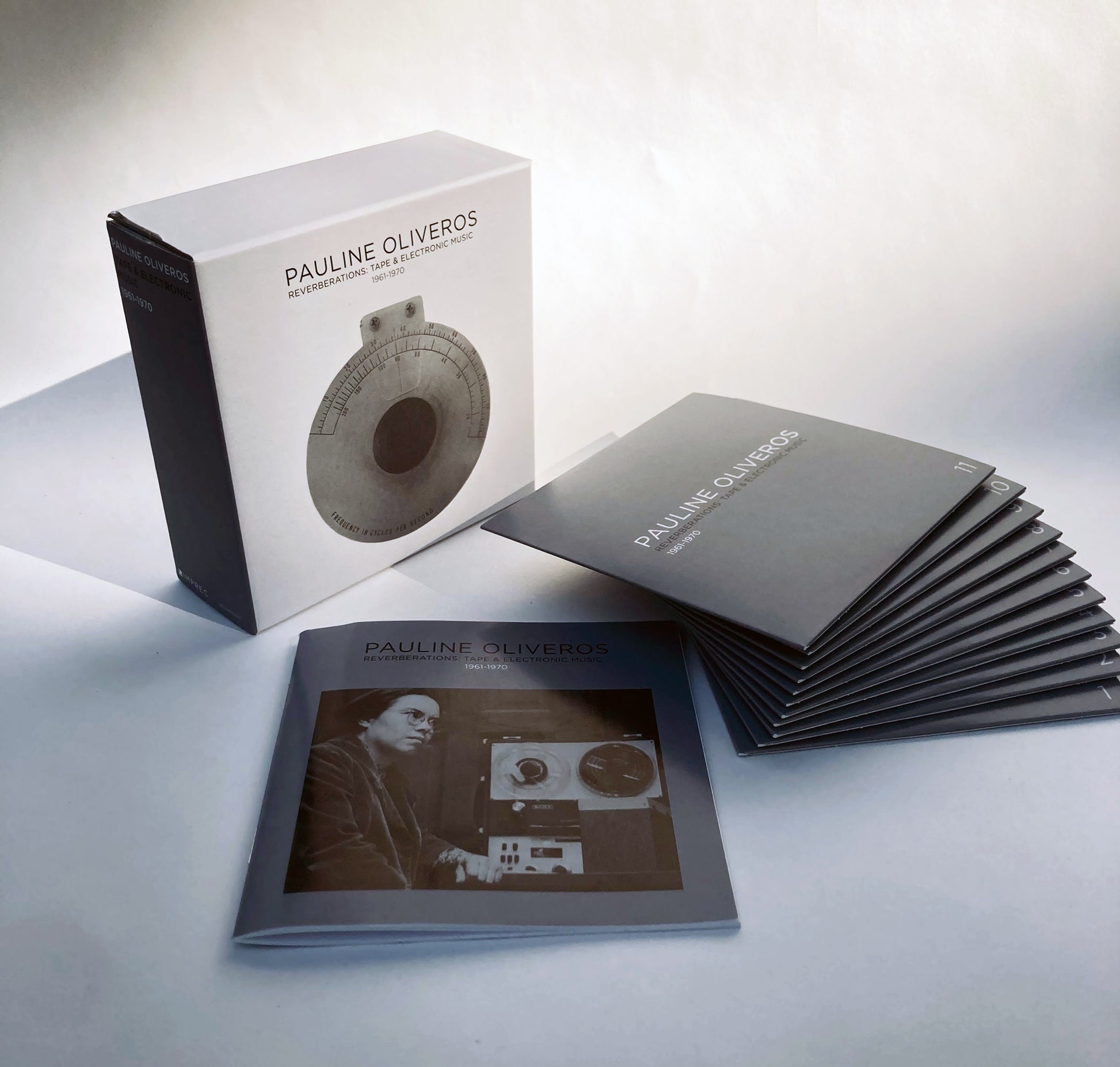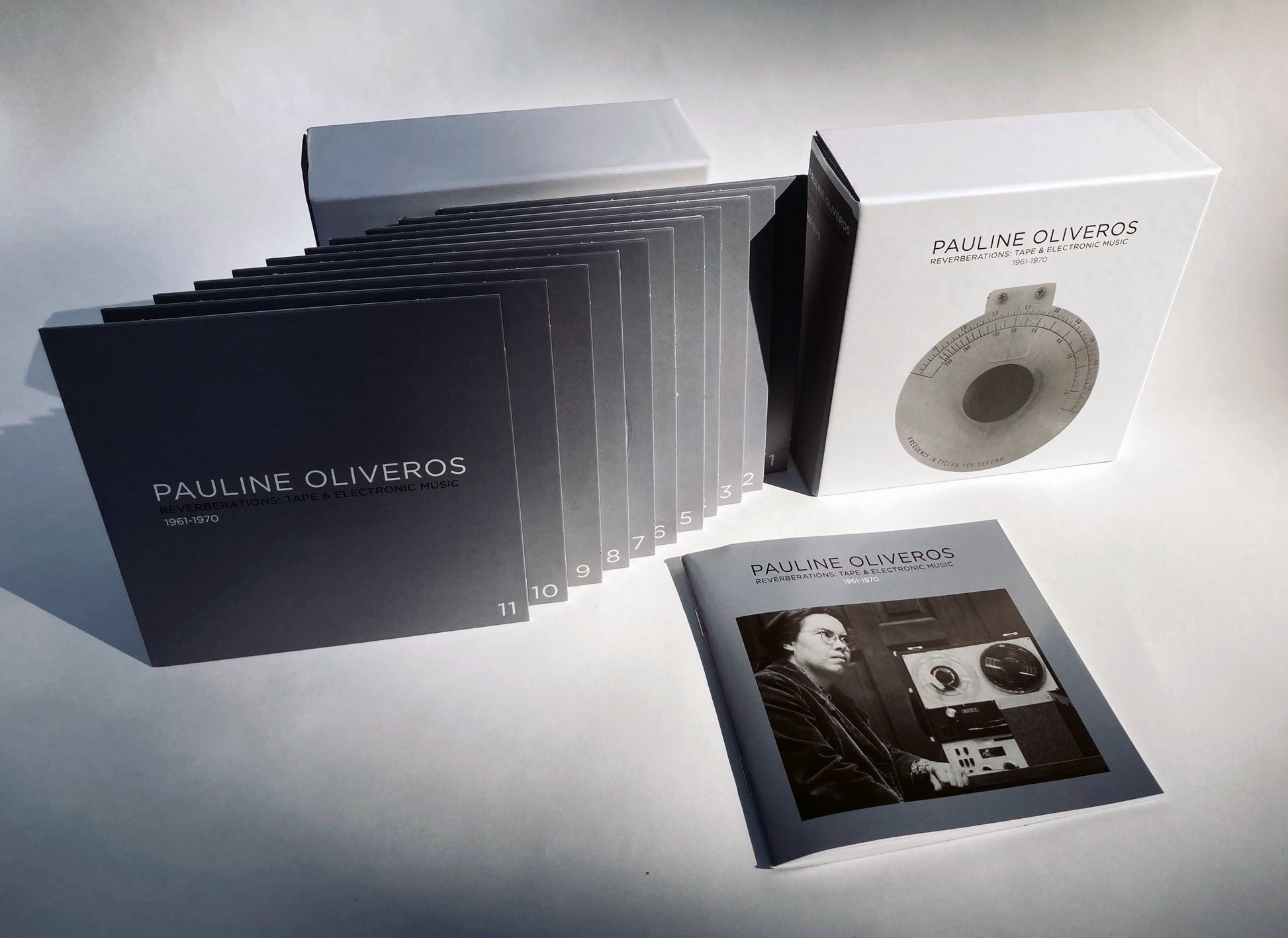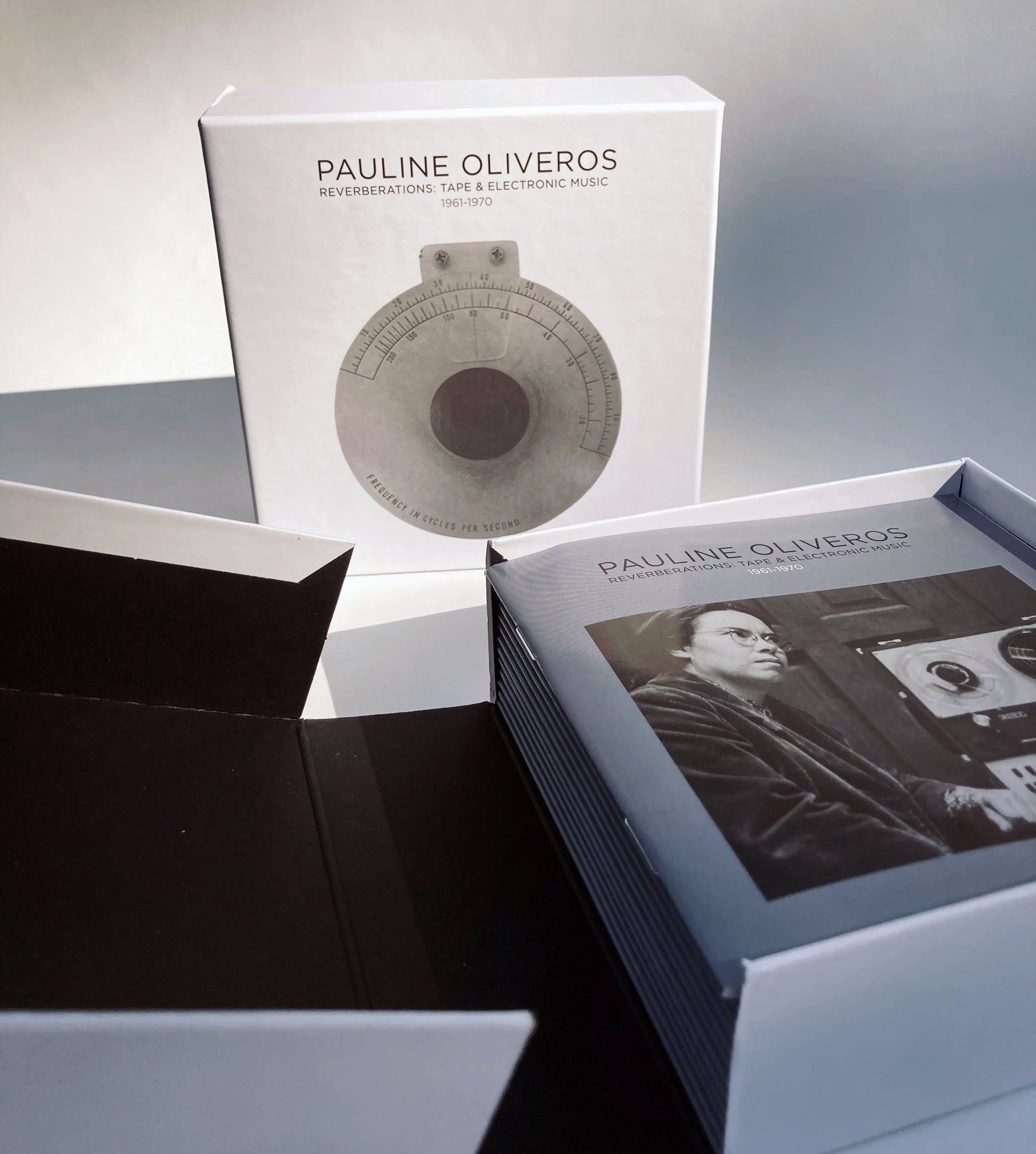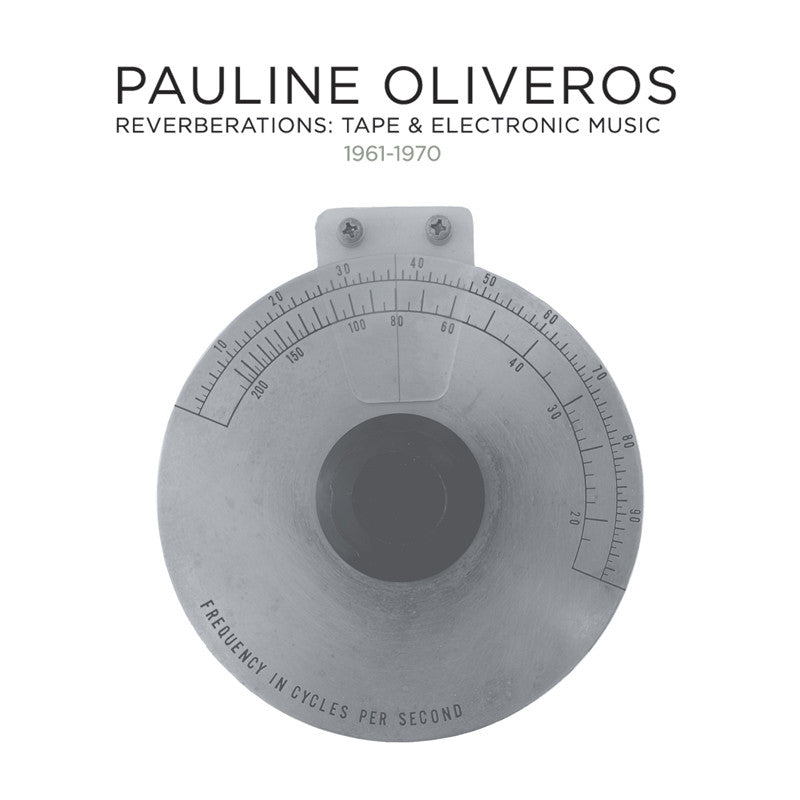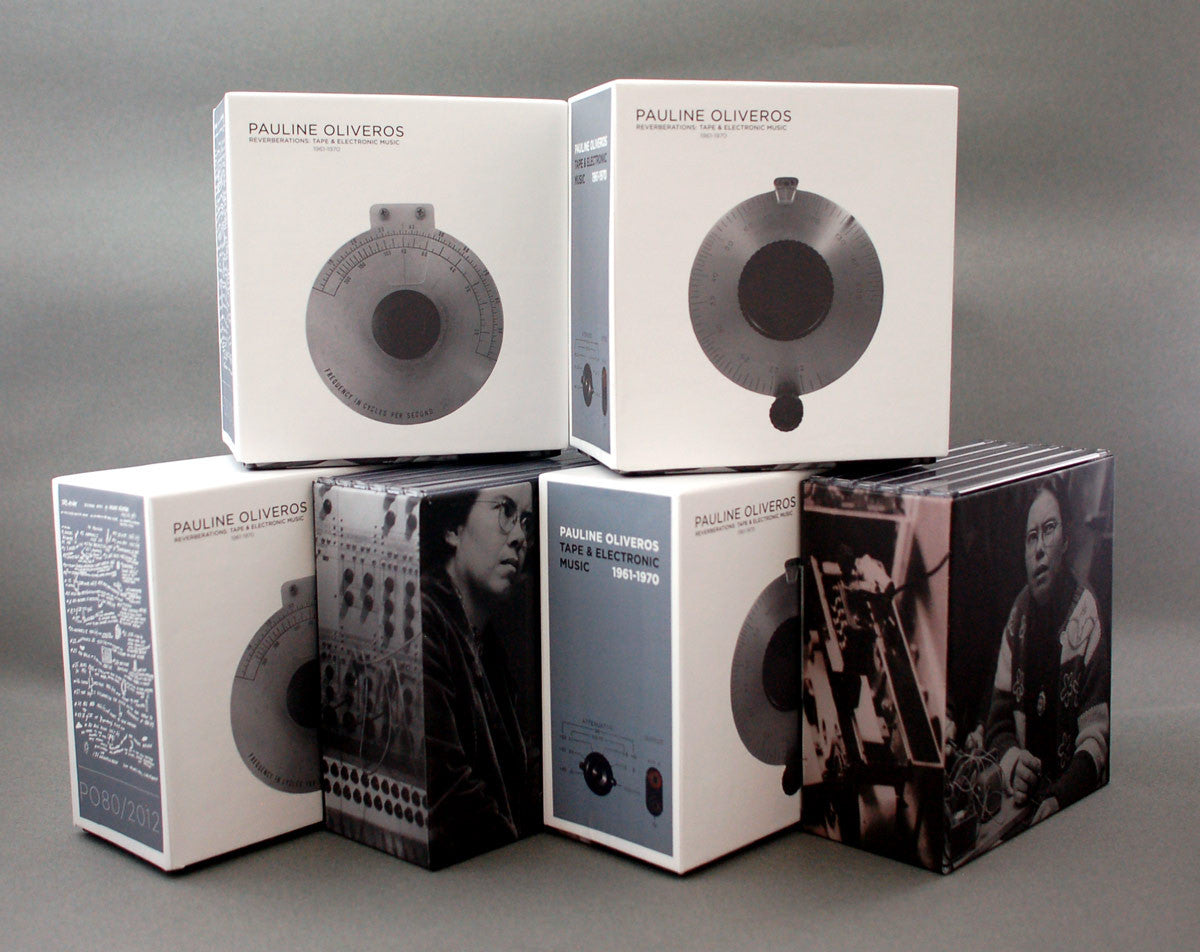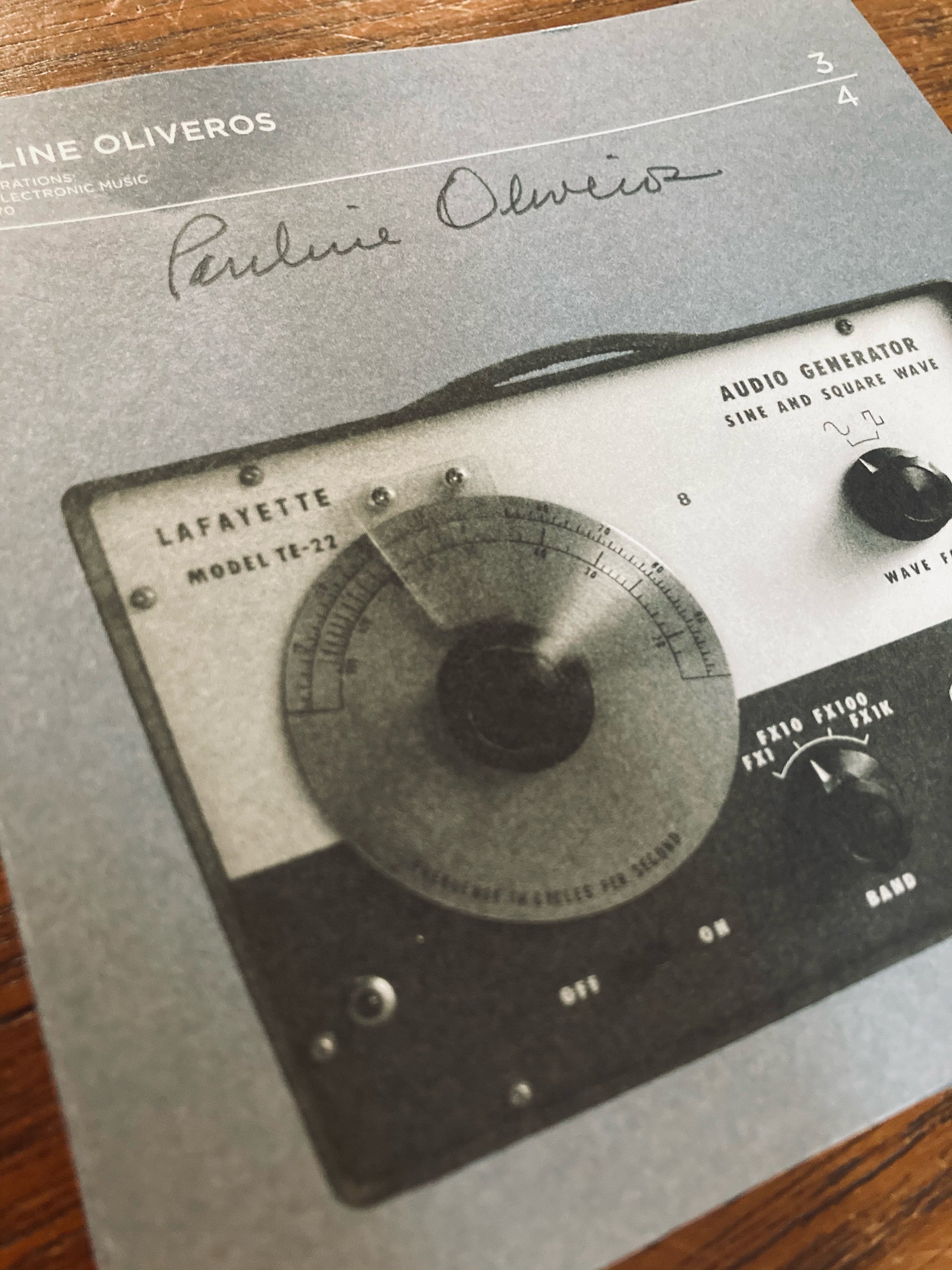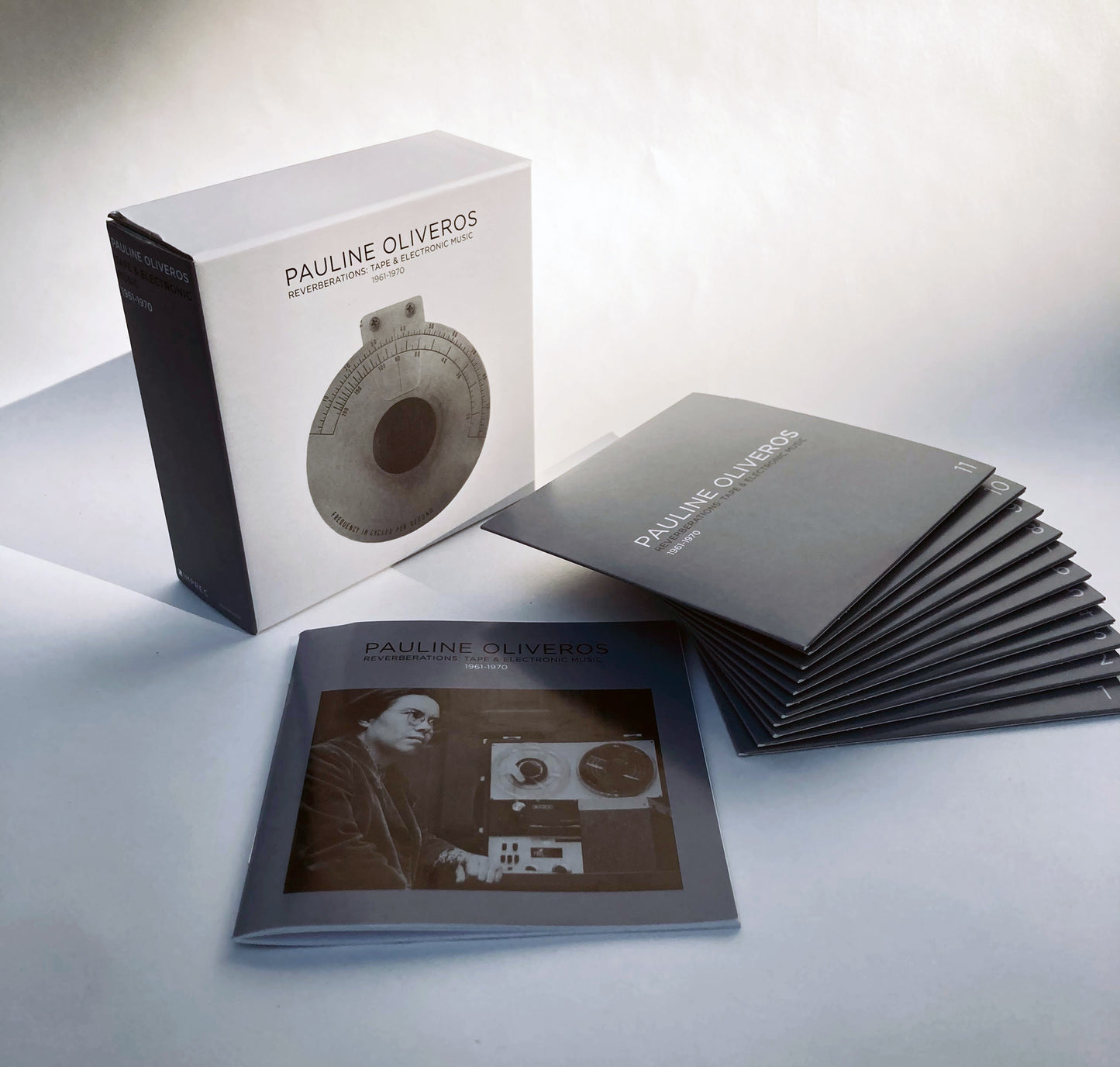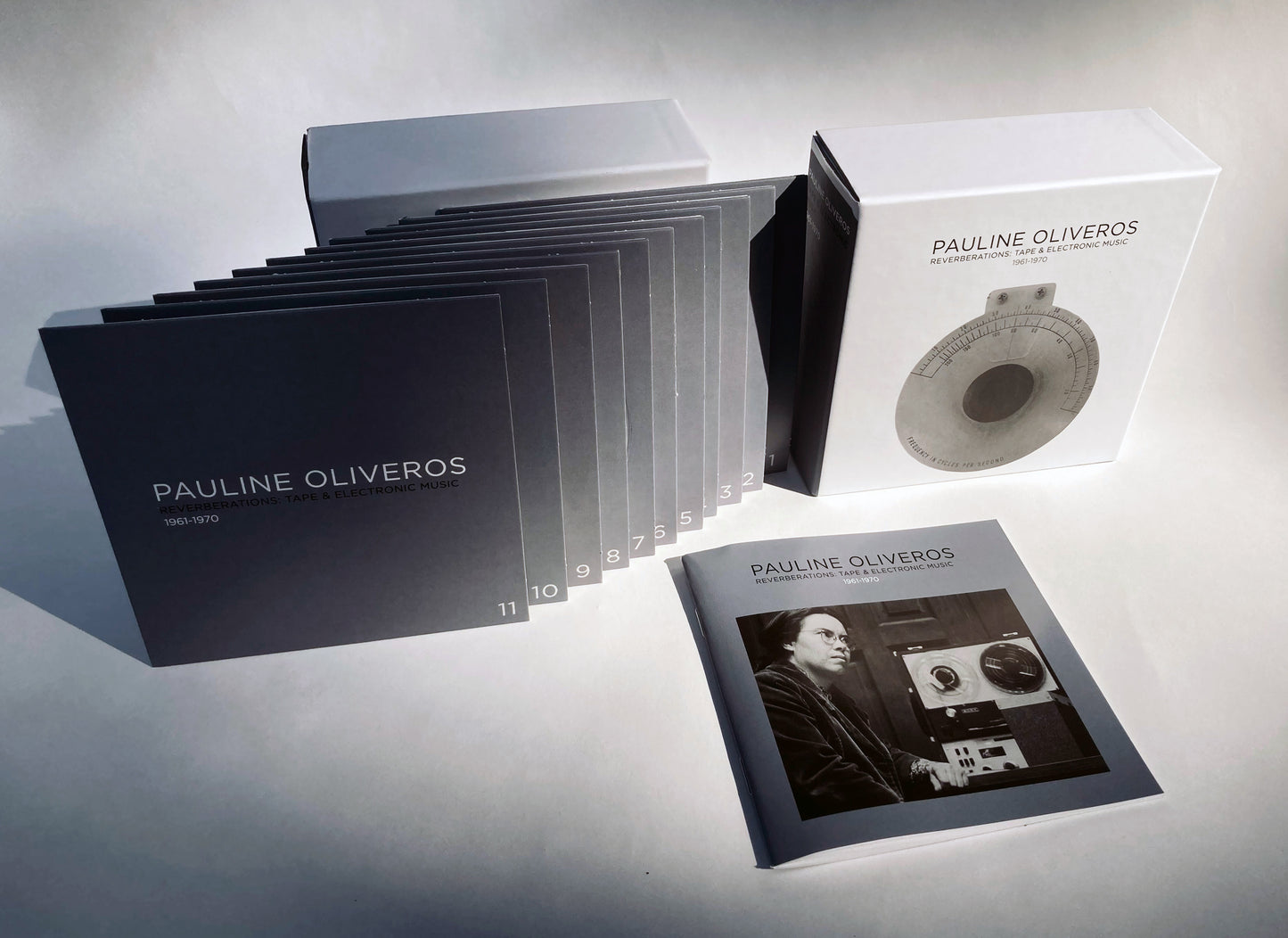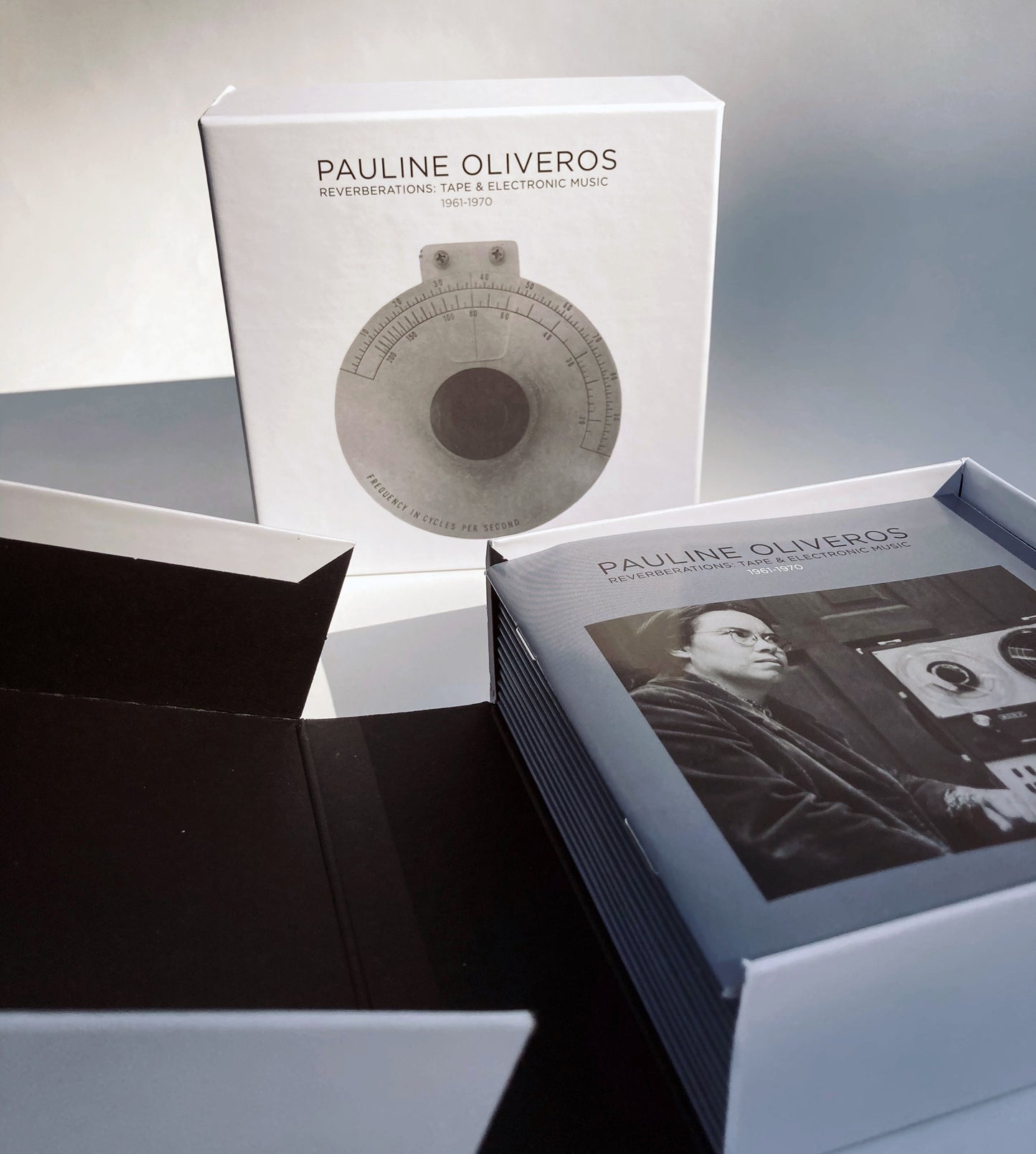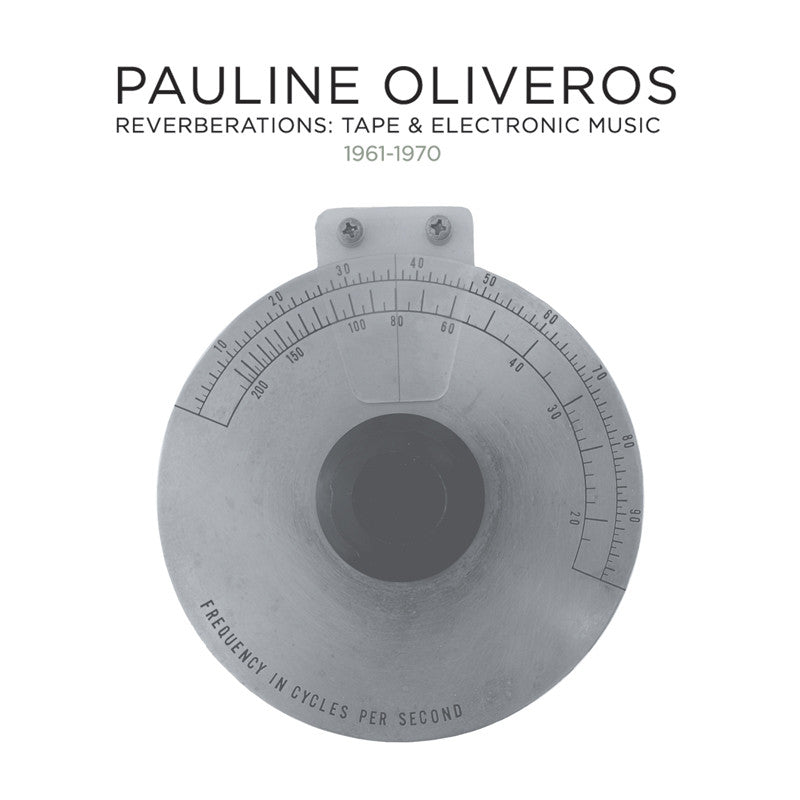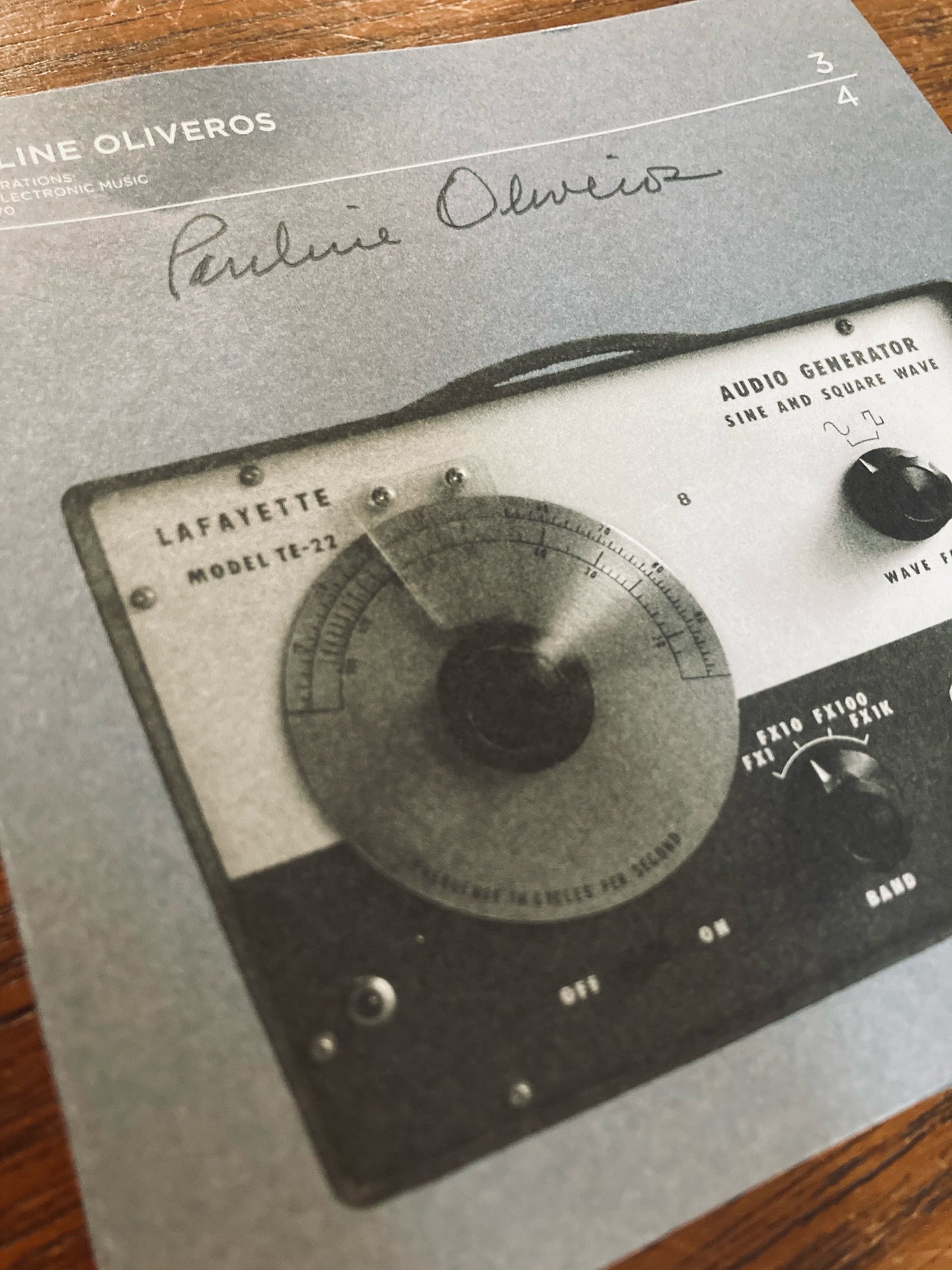Pauline Oliveros - Reverberations: Tape & Electronic Music 1961-1970 - 11CD
Pauline Oliveros - Reverberations: Tape & Electronic Music 1961-1970 - 11CD
Couldn't load pickup availability
Share
- 11 CD set adapted from 12 CD edition. All tracks included.
- Clamshell style box w/ single pocket disc sleeves similar to the Bertoia box
* 2012 Edition Signed *
- 7 original boxes are still available signed by Pauline
"On some level, music, sound consciousness and religion are all one, and she would seem to be very close to that level." ~ John Rockwell
"Through Pauline Oliveros and Deep Listening, I now know what harmony is. It's about the pleasure of making music." ~ John Cage
"This monumental box set collects the work of the 80-year-old composer, teacher, and electronic music pioneer: Reverberations fills a dozen discs in almost as many hours, laying substantial groundwork for every electronic drone artist and harsh noise terrorist to come." Pitchfork (2012)
This dense 11 disc retrospective of Pauline Oliveros’ early and unreleased electronic work includes her very first piece made for tape in 1959. Organized chronologically, this set not only documents Pauline's earliest electronic music but it also functions as an early history of electronic music itself. Follow as she participates in the establishment of the legendary San Francisco Tape Music Center and then moves to University Of Toronto Electronic Music Studio, Mills Tape Music Center and University of California San Diego Electronic Music Center.
This 10th anniversary edition is packaged in a clamshell-style box containing all the tracks from the 2012 edition spread out over 11 CDs each housed in single pocket sleeves. A 36 page booklet includes extensive liner notes and essays from Pauline Oliveros, Alex Chechile, Ramon Sender, David Bernstein, Corey Arcangel.
Pauline Oliveros was a composer, performer, humanitarian and an important pioneer in American Music. Acclaimed internationally, she forged new ground for herself and others. Through improvisation, electronic music, sonic philosophy, teaching and meditation she created a body of work with such breadth of vision that it profoundly affects those who experience it and eludes many who try to write about it.
"On some level, music, sound consciousness and religion are all one, and she would seem to be very close to that level." John Rockwell
Pauline Oliveros built a loyal following through her concerts, recordings, publications and musical compositions written for soloists and ensembles in music, dance, theater and inter-arts companies. She provided leadership within the music community from her early years as the first Director of the Center for Contemporary Music (formerly the Tape Music Center at Mills), director of the Center for Music Experiment during her 14 year tenure as professor of music at the University of California at San Diego to acting in an advisory capacity for organizations such as The National Endowment for the Arts, The New York State Council for the Arts, and many private foundations. She served as Distinguished Research Professor of Music at Rensselaer Polytechnic Institute and Darius Milhaud Composer in Residence at Mills College. Oliveros was vocal about representing the needs of individual artists, about the need for diversity and experimentation in the arts, and promoting cooperation and good will among people.
She was honored with awards, grants and concerts internationally. Whether performing at the John F. Kennedy Center in Washington D.C., in an underground cavern, or in the studios of West German Radio, Oliveros' commitment to interaction with the moment went unchanged.
Oliveros passed away peacefully on November 24, 2016 but her sonic legacy and philosophy continues to grow and inspire.
****************************************
2022 Edition track listing:
Disc 1:
1961 Pauline Oliveros Home Studio
Time Perspectives
1964-1966 San Francisco Tape Music Center
Mnemonics I
Mnemonics II
Mnemonics III
Disc 2:
1964-1966 San Francisco Tape Music Center
Mnemonics IV
Mnemonics V
Disc 3:
1966 University Of Toronto Electronic Music Studio
II Of IV
III Of IV
IV Of IV
V OF IV
III
Disc 4:
1966 University Of Toronto Electronic Music Studio
Team And Desecrations Improvisation
The Day I Disconnected The Erase Head And Forgot To Reconnect It
Jar Piece
Disc 5:
1966 University Of Toronto Electronic Music Studio
Another Big Mother
Fed Back 1
Fed Back 2
Disc 6:
1966 University Of Toronto Electronic Music Studio
5000 Miles
Angel Fix
Disc 7:
1966 University Of Toronto Electronic Music Studio
Bottoms Up 1
Nite
Ringing The Mods 1 Heads
Ringing The Mods 2 Tails
Three Pieces I
Three Pieces II
Three Pieces III
Disc 8:
1966-1967 Mills Tape Music Center
Big Slow Bog
Boone Bog
Disc 9:
1966-1967 Mills Tape Music Center
Bog Bog
Mind Bog
Disc 10:
1966-1967 Mills Tape Music Center
Mewsack
1967-1970
University Of California San Diego Electronic Music Studio
50/50 Heads(Buchla Piece head out)
50/50 Tails (Buchla Piece tails out)
Disc 11:
1967-1970 University Of California San Diego Electronic Music Studio
A Little Noise In The System
Red Horse Headache
********************************
REVIEWS
SPIN 60th Best Underground Record of the Sixties
Pitchfork "Best New Reissue" 9.0 rating
Music Media Monthly:
"Never has the Important Records label earned its name more thoroughly than it does with this monumental collection of electronic music by one of the true grandes dames of 20th-century composition, Pauline Oliveros. She was a pioneer in the field of avant-garde electronic music, joining the San Francisco Tape Music Center shortly after its founding in the 1960s and helping to redefine the very structure and assumptions underlying modern art music. This 12-disc box brings together an enormous program of her early recordings. (Given that they are tape-native works, it's not entirely clear whether they should be called 'compositions' or 'performances.') Most of these have never before been released, which adds greatly to the value of the collection. What diminishes its value (and accounts for a grade of A- rather than A+ for the release) is the really quite inexcusable lack of detailed liner notes. A skimpy 32-page booklet is included with the first CD case, and it includes a couple of gushing encomia from her colleagues, a brief note of thanks and personal history from the composer, and a longer essay that includes very brief notes on the works themselves - but what a set like this cries out for is a piece-by-piece description of the instruments used and the compositional techniques employed. (To give a piece the title 'The Day I Disconnected the Erase Head and Forgot to Reconnect It and offer no further explanation is just cruel - although I suppose one could argue that the title is essentially self-explanatory.) This lack of information is especially regrettable given the pedagogical importance of a set like this; for students of 20th-century music this box is a treasure trove, or could have been if it were more informative. That said, the packaging itself is both attractive and functional; as for the music, it's not always pleasant, but is consistently fascinating–and very much of its time and place. Despite the weakness of the accompanying materials, this set represents the rescue from oblivion of music that should never be forgotten and a watershed in the documentation of America's musical history. Grade: A-"
New York Times:
Strange Sounds Led a Composer to a Long Career, by Steve Smith
"'MOST people don't remember Wilma Deering,' the composer Pauline Oliveros said, recalling a formative influence from her childhood in Houston in the 1930s. Intrigued by sound from an early age, Ms. Oliveros had few role models to follow. Inspiration would come from a more unconventional source.
"'Wilma Deering was Buck Rogers's co-pilot,' Ms. Oliveros said of the recurring character in 'Buck Rogers,' a science-fiction saga serialized by CBS Radio. 'She was not only a woman in a co-pilot situation, but she was a lieutenant and then a colonel,' Ms. Oliveros said. 'This was a very advanced idea for 1932.'
"That Ms. Oliveros might find common cause with a courageous, assertive female leader, thriving in a futuristic milieu of instantaneous long-distance travel and telepathic communication, could only strike longtime followers of her work as prescient. Like her fictional forebear, Ms. Oliveros has become a trailblazer.
"Her path was not always smooth. 'Why have there been no 'great' women composers?' Ms. Oliveros inquired at the start of a famous article she wrote for The New York Times in 1970. Her essay enumerated some of the causes that had prevented female composers from achieving the success and renown afforded to their male counterparts, among them sex-based prejudice and societal expectations.
"Now, in a world that recognizes female composers more readily, Ms. Oliveros has captured enough ears, shaped enough minds and accrued enough renown to warrant a claim of greatness, though she would probably be the last to assert it. This year she has traveled widely for events celebrating her 80th birthday, including a memorable career retrospective concert at the Issue Project Room and a mesmerizing set by her Deep Listening Band during the Bang On a Can Marathon, both in June.
"More concerts loom. Invited to program a two-week series at the Stone, the vital East Village musical laboratory operated by the composer John Zorn, Ms. Oliveros claimed just one evening for herself: on Aug. 21 she will collaborate with the percussionist Susie Ibarra and the pianist Thollem McDonas.
"The rest of the series, which begins on Friday, will showcase colleagues, associates and protégés who have been involved with her Deep Listening Institute and its record label. Then, on Sept. 7, Ms. Oliveros will perform at the New Museum in SoHo with Doug Van Nort, an electronic musician with whom she works regularly.
"Still, she eludes induction into the pantheon. In place of scores suited for assimilation into the Western classical canon, Ms. Oliveros offers 'Sonic Meditations,' a 1971 collection of text-based contemplations, meant to facilitate communal music making. Deep listening, a discipline she developed during the 1990s, bypasses conventional music theory in favor of expanding consciousness through cultivating a keener ear. The Deep Listening Band, a long-running collaboration with the trombonist Stuart Dempster and others, pursues slow, ritualistic improvisation in unusually sonorous acoustics.
"'I'm not dismissive of classical music and the Western canon,' Ms. Oliveros said during a wide-ranging interview at the office of her foundation in Kingston, N.Y., where she lives with her longtime partner, Ione, a writer and performance artist. 'It's simply that I can't be bound by it. I've been jumping out of categories all my life.' She laughed, a hearty sound that liberally punctuated a generous, easygoing conversation.
"Born in Houston on May 30, 1932, Ms. Oliveros described a childhood fixation on the strange special effects she heard in 'The Lone Ranger,' 'The Creaking Door,' 'The Shadow' and other radio dramas. "'I was paying attention to that,' she said, 'and I was paying attention to my grandfather's crystal radio, where he was trying to tune in the programs and would get all this static.'
"An avid accordionist from the age of 9, she took up the tuba and French horn to play in school bands and orchestras. While at the University of Houston, she studied with Willard A. Palmer, a revered accordionist and teacher. Eventually growing restless, Ms. Oliveros decided to strike out in search of a compositional mentor. 'I was 20, I had $300, and I had an accordion,' she said, chuckling.
"Drawn to California partly by Bach festivals in Carmel and Monterey, she settled in San Francisco, where she heard cutting-edge electronic works by Stockhausen, Berio and Pousseur on the Berkeley radio station KPFA-FM. When she received a tape recorder for her 21st birthday, she began to fashion her own pieces.
"After completing a B.A. in music at San Francisco State College, Ms. Oliveros studied privately with Robert Erickson, an influential composer and the KPFA music director. She taught lessons and hustled gigs to make ends meet. A 1957 film-scoring engagement with the composer Terry Riley and Loren Rush, a bassist and koto player, introduced Ms. Oliveros to free improvisation. Invigorated by the experience, the trio experimented further and recorded the results.
"'We developed a method, which was, don't talk about it, sit down and play, listen back, then discuss it,' Ms. Oliveros said. 'It was really getting into it through the listening process, and I've used that method for many, many years. We discovered that if we tried to impose rules or structure of some kind on our playing, it would fall flat. It was much better to converse openly.'
"In 1961 Ms. Oliveros and two like-minded composers, Ramon Sender and Morton Subotnick, established the San Francisco Tape Music Center. A scrappy hub of creativity and technological advance whose effect is still being assessed, the center flourished until 1966, when its founders dispersed and Mills College absorbed its assets. Hired by Erickson in 1967 to teach at the University of California, San Diego, Ms. Oliveros remained there until 1981; she has since kept a toe in academia while pursuing a freelance career.
"'Reverberations: Tape and Electronic Music, 1961-1970,' a new 12-CD box issued by Important Records, provides an overview of the rigorous works she created during the center's heyday. Many still sound startlingly current. But from 1971, when a period of intense introspection provoked by the Vietnam War resulted in 'Sonic Meditations,' Ms. Oliveros has moved decisively into ritualistic improvisation and communal experiences that can involve nonspecialist participants.
"Lately much of her effort has involved impressive technological advances supported by her foundation. The Deep Listening Band uses special software to create uncanny simulations of resonant acoustics in its concerts.
"Using telematics Ms. Oliveros performs in real time with musicians in other cities and countries. Adaptive Use Musical Instruments, an interactive computer program developed with her foundation's support, enables individuals with severe physical impairments to participate in musical improvisation. Even Wilma Deering might be amazed.
"Ms. Oliveros is aware of the tendency among some critics and listeners to dismiss her latter-day direction as a mystical anachronism.
"'If you say 'deep listening,' that brings up New Age and crystals and whatnot,' she said. 'I regret that, but I don't regret it. It is a meme, and it's making its way in the world.'
"But about the metaphysical aspects of her work, she is firm: 'If it has a spiritual component, I'm very glad. It's because we're not listening to one another that things are in a mess.'"
This article has been revised to reflect the following correction:
Correction: August 14, 2012
An earlier version of this article gave an incorrect date for a performance by Pauline Oliveros at the New Museum in SoHo with Doug Van Nort. It is Sept. 7, not Sept. 9.
